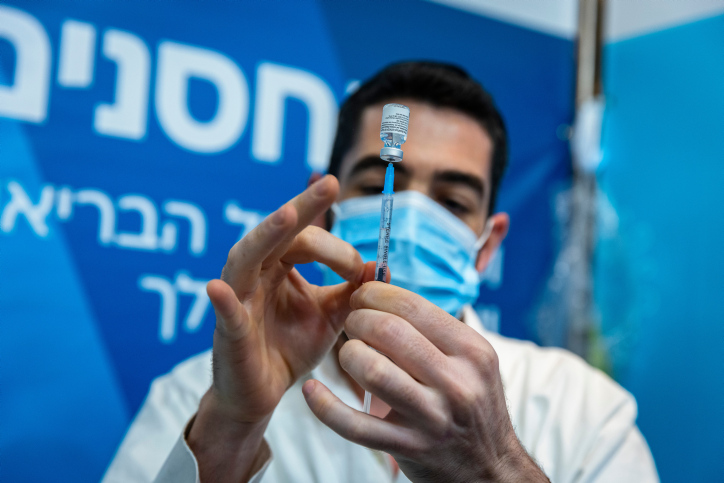Health Ministry Eyes Vaccinating Under 12s Within Weeks

On Tuesday, the Food and Drug Administration endorsed kid-size doses of Pfizer’s vaccine shots for five-11-year-olds.
An FDA panel voted unanimously, with one abstention, that the vaccine’s benefits in preventing COVID in that age group outweigh any potential risks. That includes questions about a heart-related side effect that’s been very rare in teens and young adults despite their use of a much higher vaccine dose.
While children are far less likely than older people to get severe COVID, ultimately many panelists decided it’s important to give parents the choice to protect their youngsters – especially those at high risk of illness or who live in places where other precautions, like masks in schools, aren’t being used.
“This is an age group that deserves and should have the same opportunity to be vaccinated as every other age,” said panel member Dr. Amanda Cohn of the Centers for Disease Control and Prevention.
The FDA isn’t bound by the panel’s recommendation and is expected to make its own decision within days. If the FDA concurs, there’s still another step: Next week, the CDC will have to decide whether to recommend the shots and which youngsters should get them.
Full-strength shots made by Pfizer and its partner BioNTech are already recommended for everyone 12 and older but pediatricians and many parents are clamoring for protection for younger children.
Pfizer studied 2,268 elementary schoolchildren given two shots three weeks apart of either a placebo or the kid dose. Vaccinated youngsters developed levels of virus-fighting antibodies just as strong as teens and young adults who got the full-strength shots. More importantly, the vaccine proved nearly 91% effective at preventing symptomatic infection – based on 16 cases of COVID-19 among kids given dummy shots compared to just three who got vaccinated.
The kid dosage also proved safe, with similar or fewer temporary side effects – such as sore arms, fever or achiness – that teens experience. At FDA’s request, Pfizer more recently enrolled another 2,300 youngsters into the study, and preliminary safety data has shown no red flags.
But that study isn’t large enough to detect any extremely rare side effects, such as the heart inflammation that occasionally occurs after the second full-strength dose, mostly in young men and teen boys. The panel spent hours discussing if younger children, given a smaller dose, might face that side effect, too.
Statistical models developed by FDA scientists showed that in most scenarios of the continuing pandemic, the vaccine would prevent far more COVID-19 hospitalizations in this age group than would potentially be caused by that rare heart problem.
FDA’s models suggested the vaccine could prevent 200-250 hospitalizations for every one million youngsters vaccinated – assuming that virus spread remained high, something that is hard to predict. FDA scientists also said younger kids likely won’t have as much risk of heart inflammation as teens but if they did, it might cause about 58 hospitalizations per million vaccinations.
Moderna vaccine manufacturer also is studying its vaccine in young children, and Pfizer has additional studies underway in those younger than five.
In Israel, Health Ministry Director-General Nachman Ash told Army Radio after the FDA ruling, he estimated the country will begin vaccinating children “in a few weeks.”
He said Israel does not have the doses required for the campaign yet but assured that the ministry would do its utmost “to make the vaccines accessible to all children so that there will be no delay in the immunization. We need to be prepared for another wave – the more people get vaccinated, the less severe the morbidity will be. Getting infected with the coronavirus can lead to more severe side effects than getting vaccinated.”
Prime Minister Naftali Bennett is scheduled to meet with senior health officials on Wednesday afternoon to discuss the FDA ruling. The final decision, however, will be made on Nov. 4 during a meeting with the ministry’s Advisory Committee on Infectious Diseases and Immunizations.
In any case, pediatricians in Israel have already welcomed the announcement.
“I am happy about the decision of the FDA advisory committee, this is a step that will open the door to vaccinating children, and we will discuss this in Israel as well,” President of the Israeli Pediatric Association Professor Zachi Grossman said.
“We listened to what was said in the FDA [Tuesday] and we will have the data and all this will be discussed this coming Thursday. I will recommend proceeding with the [children’s] vaccinations and I am sure that most of the members will do the same.”
To Read The Full Story
Are you already a subscriber?
Click "Sign In" to log in!

Become a Web Subscriber
Click “Subscribe” below to begin the process of becoming a new subscriber.

Become a Print + Web Subscriber
Click “Subscribe” below to begin the process of becoming a new subscriber.

Renew Print + Web Subscription
Click “Renew Subscription” below to begin the process of renewing your subscription.












